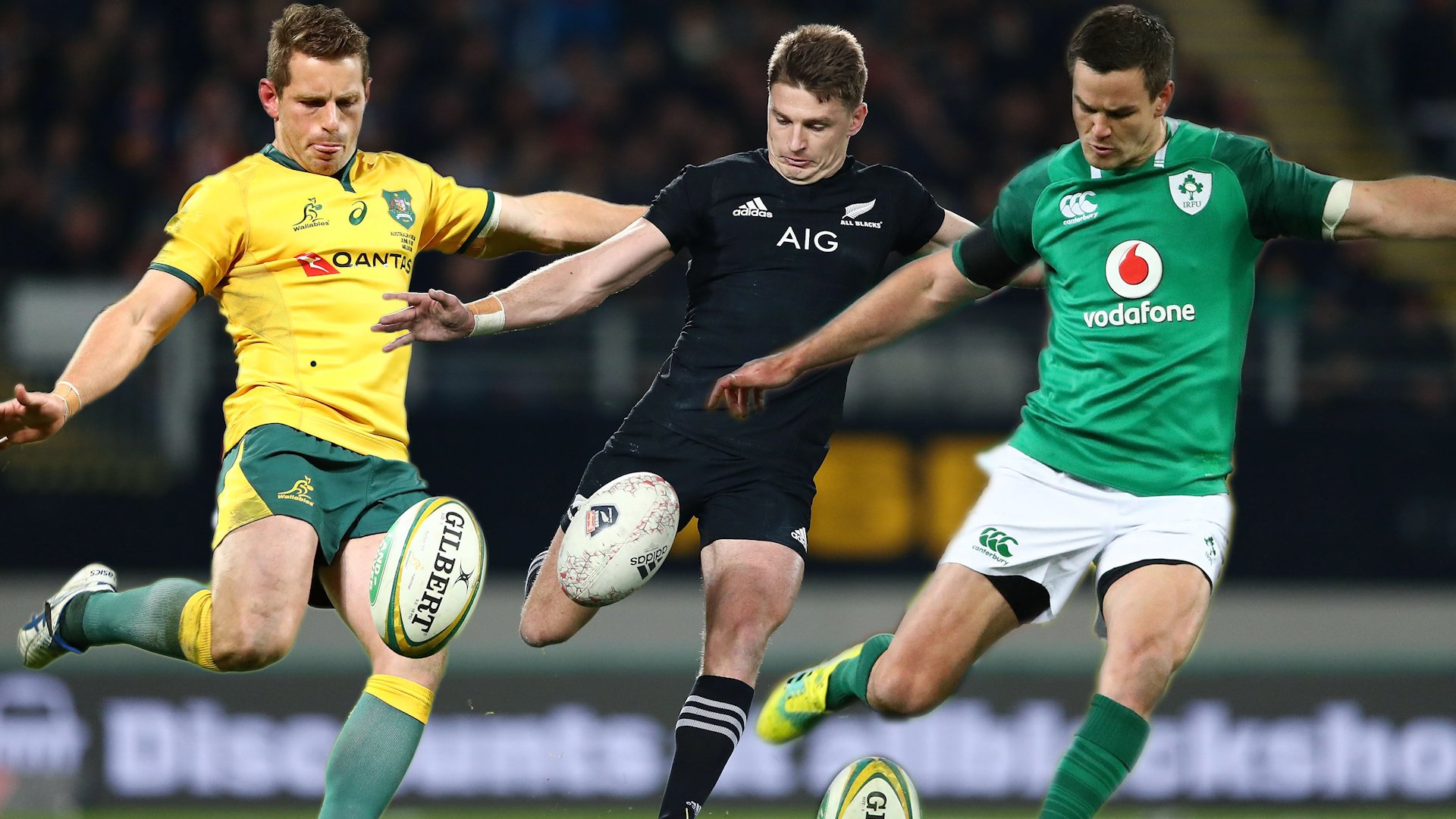The “fly-half” or as our Kiwi friends would refer to it, the “first five-eighth”, is possibly the most pivotal position on the rugby pitch. Between being the key decision maker, managing and reading the game, it’s probably the position that comes with the most pressure.
We aim to provide a snapshot of fly-halves from the top eight teams according to the latest world rankings and compare each tens individual statistics.
While it will undoubtedly be argued that much of the skills a fly-half should possess are unquantifiable, the results appear to be pretty close to popular consensus. With that said, the following are the top eight ranked national rugby teams in the world.
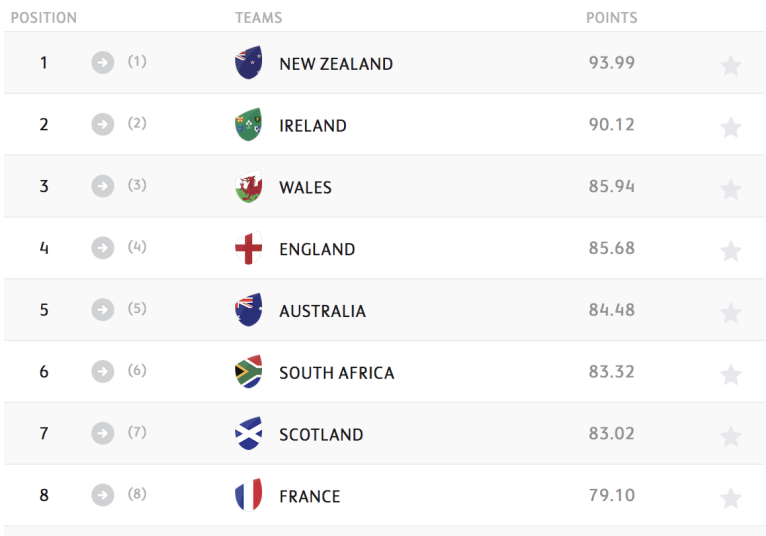
In order to do a comparison of fly-halves, it’s fairer to compare players over an equal amount of minutes played instead of on a game by game basis. The idea is to judge and compare their impact over a similar amount of time played.
Sexton only had 1301 minutes of international game time since 2016 which was the lowest of the top seven teams. Not hugely surprising given how vital he is to Ireland’s game. The Irish tend to wrap the 32-year-old in cotton wool for the majority of the year, only taking him down from the shelf when absolutely necessary.
French fly-halves accrued the least amount of minutes played, having to go back as far as the start of 2014, when Camille Lopes managed to string together 980 minutes. The top seven were all at least on 1300 minutes from the start of 2016 to now, with some even getting over 2000 minutes played in that time.
This points to France’s ongoing conundrum on who should be their main fly-half. Although we wanted as many minutes as possible, it was felt it would have been unfair not to include a French representative so the promising Anthony Belleau is thrown into the mix but the primary focus will be on the top seven.
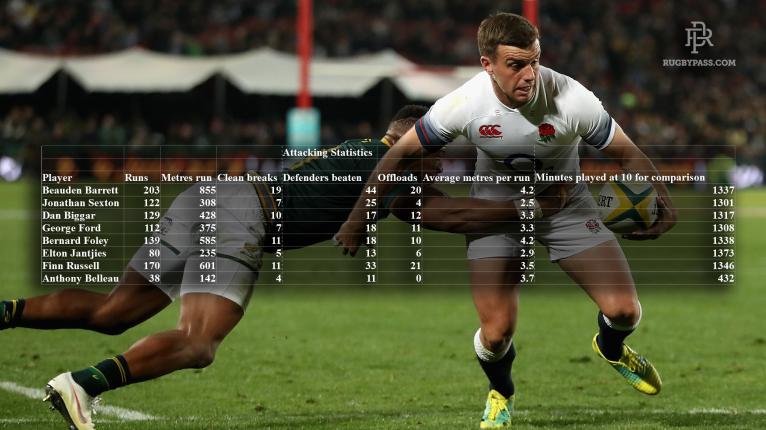
If we sat down and argued right now about who the best fly-half in the world is, chances are we would eventually settle on Beauden Barrett.
Granted he is just 30 minutes over the minimum of minutes played that we were looking for, but his numbers are phenomenally impressive. Topping pretty much every area in attacking statistics with 203 runs, 855 metres run, 19 clean breaks, 44 defenders beaten, 20 offloads and an average amount of metres per run of 4.2 metres over 1337 minutes.
Impressively Foley managed to tie Barrett for the average metres per run with 4.2m also over a nearly identical 1338 minutes played.
Finn Russell has the most offloads with 21, just about pipping Barrett’s 20. He has the 2nd most defenders beaten with 33 and is tied for 2nd in terms of clean breaks with Foley at 11. Russell also has a very respectable 3.5m per run on average over 1346 minutes.
Sexton has the lowest amount of offloads made at just 4 but that’s more indicative of Ireland’s playing style. The most disappointing attacking display seems to be Jantjies in this comparison. Jantjies made only 5 clean breaks, 13 defenders beaten, 6 offloads and an average of 2.9m per run over 1373 minutes.
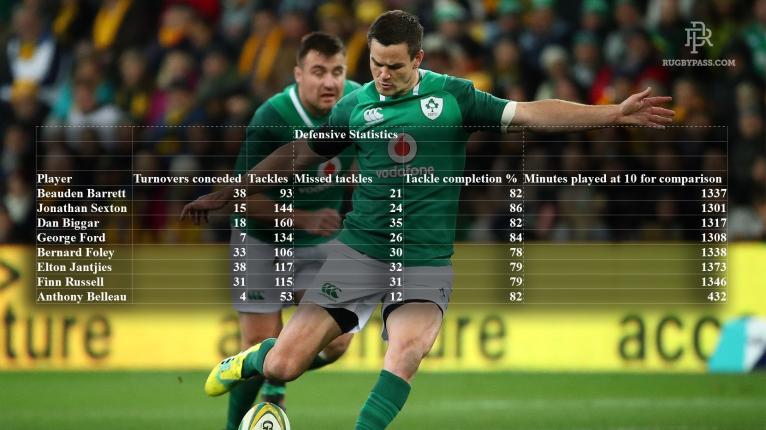
Moving to the defensive side of things, Sexton comes out with the 2nd most tackles made but has the best tackle completion percentage of 86%. He also has the 2nd lowest amount of turnovers conceded at just 15.
George Ford has a miserly 7 turnovers conceded and the 2nd best tackle completion percentage with 84% over 1308 minutes.
Barrett is actually tied with Jantjies for the most turnovers conceded with 38, somewhat surprising. Foley has the worst tackle completion percentage with 78% over 1338 minutes. Jantjies and Russell also have poor tackle completion percentages with 79% each.
Surprisingly Biggar has the most tackles made in this comparison with 160 and a tackle success rate of 82%. He also has a relatively low amount of turnovers conceded in an impressive defensive performance over 1317 minutes.
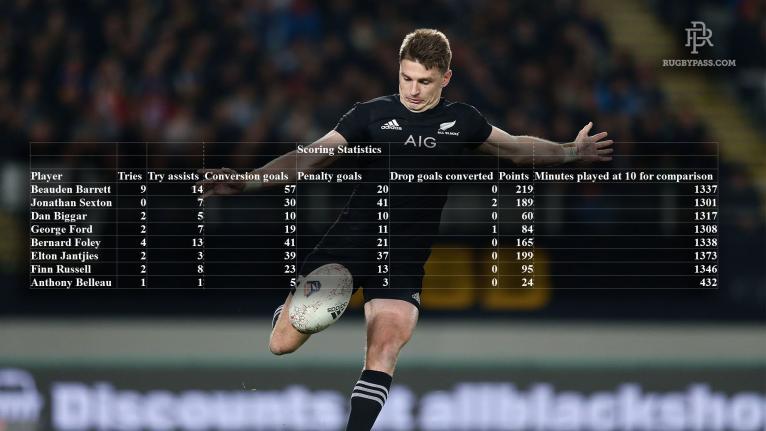
Unsurprisingly, Barrett tops the try charts with 9 tries and 14 try assists, indicative of New Zealand’s prowess when it comes to tries, finding himself on top of the pile with 57 conversions scored.
Ireland are known to be a complete menace at the breakdown resulting in indiscipline from opponents and it shows up here, as Sexton finds himself with the most penalties scored.
Regarding the small number of penalties scored by Biggar, Ford and Russell, this seems to be a result of having at times Halfpenny, Farrell and Laidlaw being the designated kickers.
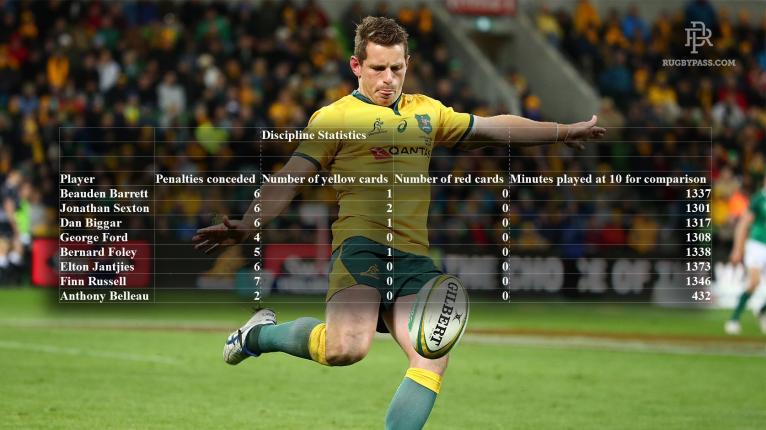
Ford, the most impressive ten when it comes to discipline in this comparison, with only 4 penalties conceded and no cards over 1308 minutes. Unsurprisingly Sexton has 2 yellow cards, the most of the top seven teams. There isn’t a huge difference in terms of penalties conceded in this comparison from the fly-halves but Russell tops the penalties conceded with a total of 7.
From the stats, it’s safe to say that Beauden Barrett is far and away the best-attacking fly-half and Jonathan Sexton the best defensive fly-half in the world.
Seems about right.











































